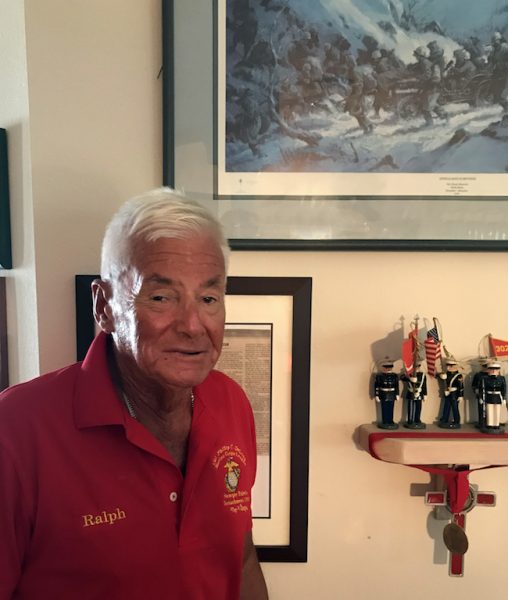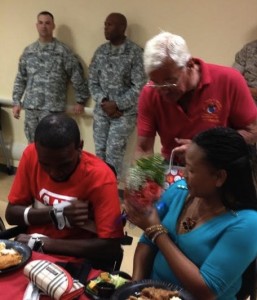After a few hours at at the Marine Corps’ Parris Island boot camp, Ralph Hoffman thought, “I don’t think I’m going to get out of this place alive!” Graduating in January 1950 from high school in Mineola on Long Island, N.Y., Ralph and his friend were on a train bound for South Carolina the next day. When they arrived “We were run all over the place, spoken to harshly, and it was 2 a.m. before they let us go to bed,” he laughs.
Ralph not only survived Parris Island, he also survived one of the most pivotal battles of the Korean War.
After his recruit training Ralph was stationed for a time at Camp Lejeune and then sent to Quantico, Va. where he and others maintained the grounds at a training base until June 25, when some 75,000 Communist North Korean soldiers crossed the 38th parallel and invaded South Korea. “A couple of days later we were all on our way back south and started packing for a transfer to somewhere – it wasn’t hard to guess that we were going to Korea.”
Assigned to be a communications radio operator, Ralph’s responsibilities included getting the batteries and other equipment set up. A month later they were on another train for the west coast. “We took the southern route across the U.S., ate in the dining car and saw the country, which was really neat.”

After another month in California that included training and more obtaining supplies, they shipped out, arriving in Korea a week or so later. Again, it was a good trip, the last Ralph would have for some time. “It was an old, World War II ship that had been used to bring war brides back to the U.S. from Britain and France. Comfortable and we had some nice meals,” he remembers.
The next ship, heading along the coast of Korea, was a left over LST from World War II manned by a Japanese crew. “The second day we ran into a typhoon Two guys got washed overboard and lost. Fortunately, I didn’t get seasick. I remember standing on deck holding the rail. The ship would roll, and we’d almost go down – you could touch the water. Then it would roll back and you could touch the sky.”
Although Ralph didn’t know it at the time, he and his unit would eventually end up in the midst of 17 days of what has become known as the Battle of Chosin Reservoir. In short, in late November 1950 the Chinese threw 120,000 men at 30,000 United Nations and American troops. The Americans, including Ralph and his Marine unit, were encircled – cut off from help. To make matters worse, the temperature dropped to as low as -35 F and the ground was covered with snow. The danger from frostbite was severe, medical supplies froze, vehicles malfunctioned, and the wet cell batteries in the radios Ralph carried quickly ran out of power. The Americans were ordered to pull out, but the steep unpaved roads in the Korean countryside were frozen and reduced to a single file track in some places. Chinese soldiers set traps and ambushes to harass the Americans.
In spite of the chaos, Ralph vividly remembers two occasions when he met Marine Lt. Gen. “Chesty” Puller, and the inspiration he gave the troops. The first was when Ralph and another Marine were walking back to battalion HQ to get their radio batteries recharged. “He came along in his Jeep and stopped to talk and asked us what we were doing. When we were finished he said ‘OK, old man. Take care.’ I was only 18 years old,” he recalls.

Ralph’s other encounter with the much-decorated Marine leader came when they were pinned down in a school yard near Seoul by a sniper in a nearby chimney. “Puller arrived, borrowed a pair of binoculars and jumped up on the top to take a look. The sniper starts shooting, boom, boom and bullets are hitting in front of the General. Then he turned and walked back down. That’s the kind of man he was. An inspiration to us.”
Eventually, after days of bitter cold, repeated Chinese assaults and hard foot slogging through the mud and snow, the Marines escaped the Chinese Army vice, earning their nicknames: “The Chosin Few” or “The Frozen Chosin.”
Back Stateside in June, with more than three years left in the Marines, Ralph used his communications and radio skills to become part of the base telephone crew.
“Basically, it was like working for the phone company,” he remembered.
It was also where he met one of the few female Marines, a telephone operator from Pennsylvania named Frances. They married, had two children, and were together for more than 50 years until she died in 2012.

His regular Marine hitch up in 1955, Ralph joined the Reserves, serving until 1980, and became part of a special group planning joint forces and Marine training exercises in the U.S. and abroad. In civilian life he worked with telephone companies like AT&T in sales and sales management. He revisited Korea three times with Marine Corps colleagues over the years.
He and Frances retired in 1992 and tried living in California.
“We liked it, but it was very expensive and kind of crazy. So, we came back east to Florida and lived north of The Villages for about 10 years and then moved here to the Village of Glenbrook. It’s a great place.”
One of Ralph’s main interests now is serving in the Marine Corps League.


“We raise money for several causes. The Rose Program remembers the Marines who died in World War I – the French put roses on the graves. The money we raise goes to various charities. We have a Helping Hands program that helps families with travel and lodging expenses when they visit loved ones at the VA Hospital in Tampa.” Ralph was also instrumental in starting the funding program for the support of Lake Hills School for severely handicapped and disabled children in Howey-in-the Hills.
Ralph is also keenly following the possible agreement between North Korea and the U.S. “We’ve got over 7,000 guys missing and still buried over there. We need to bring them back.”
John W Prince is a writer and Villages resident. Learn more at www.GoMyStory.com.

